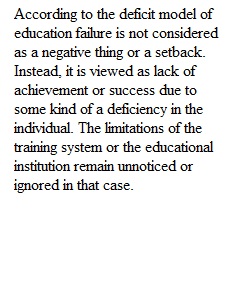


Q M13: CRR Empowering Pedagogies Objective: The objective of this Critical Reflection/Response is to critically reflect on Module 13's Lesson and to respond to the following prompt. Background: In Module 13, you applied a holistic, anthropological perspective to consider a number of different ways in which American educational institutions are subject to racial, ethnic, and other inequities. The lessons and videos presented evidence of these inequities, and also presented a number of powerful critiques of underlying social structures. Prompt: In a couple of sentences, explain how deficit models of learning operate in American educational institutions. Provide at least one salient example from the Module to evidence your explanation. What is the deficit model learning, Does it have political aspect? What is the pedagogy of empowerment? How is it different? Draw from the Module elements for inspiration (giving credit where credit is due) but feel free to draw from personal experience and to offer innovative and creative solutions. Requirements: • your work must be original • demonstrate your understanding of the Module 13 theme "Social Institutions - Education" - up to 10 pts • incorporate an anthropological perspective and effectively utilize appropriate terms and concepts - up to 10pts • identify at least two (2) required resources of Module 13 (for example, the Module readings, linked articles, YouTube film clips (esp. the Paulo Freire film clip - hint hint!, Podcasts, and related articles) in the content of your submission - up to 10pts • think critically about and mention specifically module resources or anthropological perspective has connected with you through at least one of the following - experience, inspiration, challenge, change - in response to the prompt's theme: what it means to be American - in other words, talk about "Social Institutions - Education" and tell us how what you read influenced that thinking - up to 10pts • be written in clear and concise language, free of grammatical issues, stay within the word limit - up to 5 pts • properly cite (that is, give credit) to the resources you mentioned above - up to 5pts The Instructional Assistants and I are looking for a good critical reflection, following the guidelines posted in Module 1. Instructions for submission: 1. Compose your reflection in a word document and save it so you don't lose your work. 2. Keep your reflection between 450 - 500 words (about the length of the instructions above). 3. Copy and paste your reflection here into Canvas, proofread it for spelling and grammar errors, then submit. Grading: The Grading Rubric for your Critical Reflection and Response assignments is available from the Canvas action menu.
View Related Questions